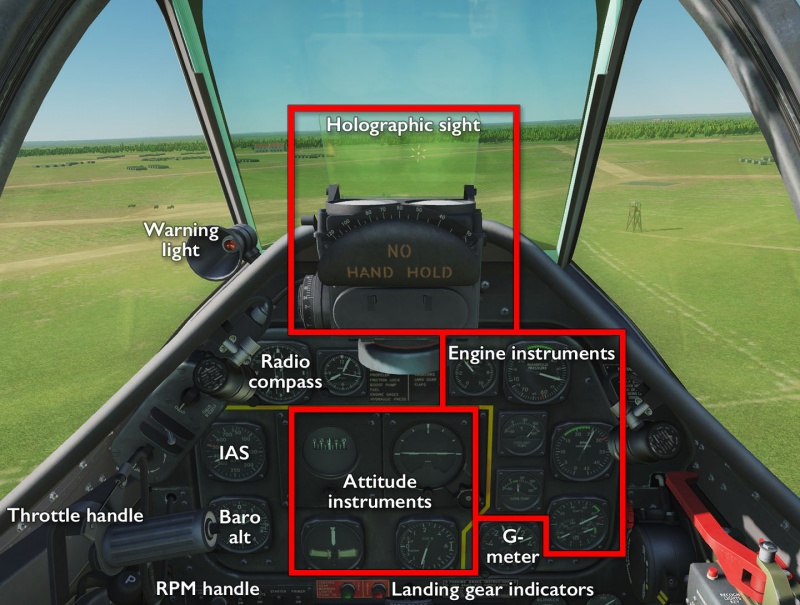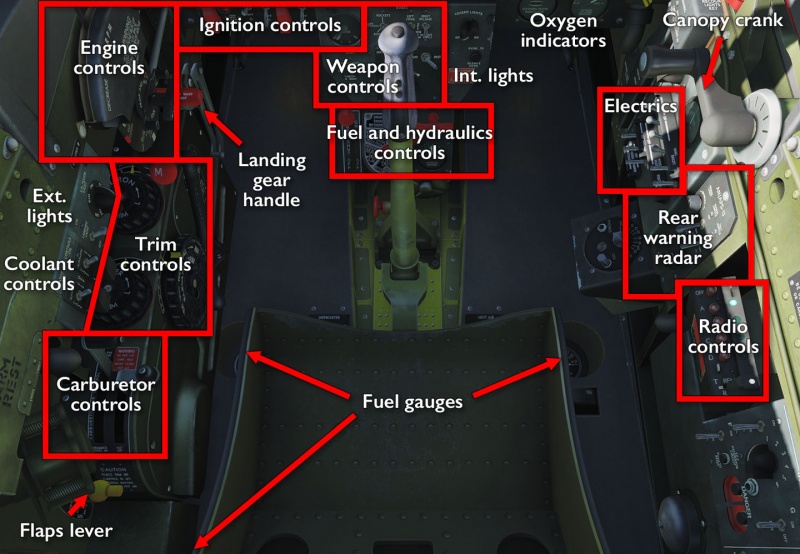P-51D Mustang: Difference between revisions
m (→�) |
m (→�) |
||
| Line 37: | Line 37: | ||
* Warming up the engine so it does not seize up. | * Warming up the engine so it does not seize up. | ||
* Bobbing and weaving al around the tarmac because manoeuvring a tail-dragger on the ground is very difficult from a modern tricycle gear setup — consult the [[#More_information|Taming the taildragger]] essays linked below. | * Bobbing and weaving al around the tarmac because manoeuvring a tail-dragger on the ground is very difficult from a modern tricycle gear setup — consult the [[#More_information|Taming the taildragger]] essays linked below. | ||
* Also, setting up your instruments since they will point you in the most absurd directions otherwise (witness the Giantbomb flight club clip below). | |||
=== Shooting something === | === Shooting something === | ||
Revision as of 21:15, 17 June 2018
Features
Comes with the built-in P-51D Challenge campaign.
TF-51D
The TF-51D is a two-seater training variant of the P-51D and comes included for free in the DCS World client. While the variant (and in-game model) itself is a two-seater, with room for an instructor and a student, the module does unfortunately not support multi-crew the way the L-39 does.
Functionally, the difference between the P-51D and the TF-51D is simply one of armaments. The TF-51D has none (although some of the cockpit controls remain), nor does it have a holographic sight to aim the non-existing weapons. Between this and the added seat, the TF-51D is ever so slightly lighter and faster than the P-51D, but not in any way that will be noticeable outside of very tightly flown races.
All procedures and checklists for one are applicable to the other — a fact that is further highlighted by how the TF-51D module included in the free client comes with the full P-51D flight manual.
Flying the P-51D
Cockpit overview
Getting into the air
As the P-51D is a full-sim aircraft, the procedure of getting it started does not readily lend itself to a quick checklist — doubly so because it is a fully manual process of getting mechanical machinery started. Like so many other aircraft, it offers the RWinHome quick-start shortcut that runs through the process for you, but outside of that, it is very much a matter of feeling, judging, and listening to the machinery for the exact timing and rhythm needed than about pushing a lot of buttons.
For a good run-though of the start-up (and indeed any other) procedure, consult Chuck's guide linked below. In broad strokes, the process is one of:
- Turning electrics on.
- Setting up the cooling and carburettor.
- Turning fuel pumps and fuel flow on.
- Priming the engine.
- Setting starting propeller settings (max RPM; minimal throttle).
- A rapid succession of operating the engine starter, turning the ignition on, and flipping mixture control on.
- Warming up the engine so it does not seize up.
- Bobbing and weaving al around the tarmac because manoeuvring a tail-dragger on the ground is very difficult from a modern tricycle gear setup — consult the Taming the taildragger essays linked below.
- Also, setting up your instruments since they will point you in the most absurd directions otherwise (witness the Giantbomb flight club clip below).
Shooting something
Links and files
- Tippis' Checklist (see also kneeboard mods).
- Vehicle Size Chart for sight adjustments.
- Chuck's P-51D guide.
- DCS: P-51D Mustang in the DCS shop.
Related DCS modules
- Charnwood for P-51D campaign.
- High Stakes for P-51D campaign.
More information
- North American P-51 Mustang on wikpedia.
- P-51 “Mustang” on globalsecurity.org
- Taming taildraggers — an essay, Part 1, Part 2, and Part 3.




